
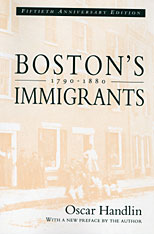


Commonwealth, when first published in 1947, was a pioneer effort to investigate the historical role of government in the American economy. It revealed for the first time the importance of political action in the development of the American free enterprise system. The present edition has been revised by the authors to take into account the research of the past two decades. Focusing on Massachusetts as a key state, Oscar and Mary Flug Handlin describe the changes in the ways the government dealt with the economy from the period of independence to the Civil War, and they analyze the social groups whose interests and ideas influenced the character of those changes.
The Handlins have re-examined both their original conclusions and the procedures by which they arrived at their formulation of the problem. They have not found it necessary to make substantial textual revisions, for both their research methods and their conclusions have stood the test of time, and their basic concepts have already been incorporated into the literature. However, they have made stylistic changes and have drastically altered their documentation, rigorously pruning the old footnotes and incorporating into the new notes important recent books and articles which treat the political and economic history of the period and the local history of the stale.
There are two significant additions to the book: a new preface and a new appendix that explain the theoretical framework through a description and demonstration of the change in the authors’ attitude and focus during the course of their original research.
This revision of Commonwealth is as cogent as the original edition, more useful to scholars because of its incorporation of the latest scholarly literature, and, as a result of the reduction in documentation, more attractive to the general reader.


Oscar and Lilian Handlin show us how the new voyagers in the twentieth century--from Asia, Africa, Australia, and Latin America--record their experiences in the United States. The narratives of the non-Europeans, they find, clearly reflect the circumstances of their composition, as well as the political prejudices of their authors. These literary products have earned far less attention than those of the English, French, Germans, and Russians, and this volume proposes to redress the balance.
The earliest of the thirty-one travel accounts was written by Rabindranath Tagore in 1924, and the most recent by V. S. Naipaul in 1989. Many accounts are newly translated from Arabic, Persian, Hebrew, and Spanish. Some authors are well known, but the less famous are equally insightful. Some insights are weighty, many are amusing. Octavio Paz, a sympathetic observer who admired his country's neighbor, was uneasy that the most powerful country in the world sustained "a global ideology…as outdated as the doctrine of free enterprise, the steam boat, and other relics of the nineteenth century." The Israeli journalist Hanoch Bartov observed that "God conceived the car first, with man an afterthought, created for the car's use (a Southern California legend)." In coming to a truer understanding of the United States, these writers noted the frightening repercussions of unsettled lives, perceived class differentiation, contentions regarding the status of women, the sense of national unity amid diversity, and countless other issues of concern to those who try to find meaning in the contemporary world.
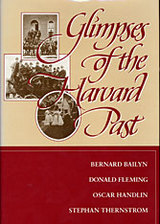
This happy combination of literary essay and exceptionally well-written history, providing insights into a past still important in the twentieth century, will quickly take an honored place on the shelves of Harvardiana.
Bernard Bailyn writes on the origins of Harvard and the foundations of Harvard’s persistent character, structure, and style of governance, and contributes another chapter on the unhappy ending to the administration of the beloved President Kirkland, who presided over but could not control a period of profound change. Oscar Handlin describes the shifting relationships and power struggles among faculty, administration, and students over the years (“Making Men of the Boys”) and Harvard’s evolution from an ingrown community of teachers and students into a large, complex institution with worldwide prestige. Donald Fleming has chapters on the presidency of Charles William Eliot (“the greatest man in the history of Harvard”) and the colorful personalities of Harvard (not only “Copey” and Santayana and Charles Eliot Norton, but also “Old Sophy,” who kept a pet chicken in his room in Holworthy). Stephan Thernstrom examines the growing diversity of the student body as to finances, geography, religion, and racial background from the eighteenth century to the 1980s.
The subjects are of continuing interest not only to members of the Harvard community, who will treasure this memento of Harvard’s 350th anniversary, but also to historians of higher education and ordinary readers, who will enjoy the new information, original personalities, and thoughtful perspectives the book offers.

From Acadians to Zoroastrians-Asians, American Indians, East Indians, West Indians, Europeans, Latin Americans, Afro-Americans, and Mexican Americans—the Harvard Encyclopedia of American Ethnic Groups provides the first comprehensive and systematic review of the many peoples of this country. It should excite all Americans about their nation.
Informative and entertaining, this volume is an indispensable reference work for home, library and office. It establishes a foundation for the burgeoning field of ethnic studies; it will satisfy and stimulate the popular interest in ancestry and heritage. It is a guide to the history, culture, and distinctive characteristics of the more than 100 ethnic groups who live in the United States.
Each ethnic group is described in detail. The origins, history and present situation of the familiar as well as the virtually unknown are presented succinctly and objectively. Not only the immigrants and refugees who came voluntarily but also those already in the New World when the first Europeans arrived, those whose ancestors came involuntarily as slaves, and those who became part of the American population as a result of conquest or purchase and subsequent annexation figure in these pages. The English and the Estonians, the Germans and the Gypsies, the Swedes and the Serbs are interestingly juxtaposed. Even entries about relatively well-known groups offer new material and fresh interpretations. The articles on less well-known groups are the product of intensive research in primary sources; many provide the first scholarly discussion to appear in English. One hundred and twenty American and European contributors have been involved in this effort, writing either on individual groups or on broad themes relating to many.
The group entries are at the heart of the book, but it contains, in addition, a series of thematic essays that illuminate the key facets of ethnicity. Some of these are comparative; some philosophical; some historical; others focus on current policy issues or relate ethnicity to major subjects such as education, religion, and literature. American identity and Americanization, immigration policy and experience, and prejudice and discrimination in U.S. history are discussed at length. Several essays probe the complex interplay between assimilation and pluralism—perhaps the central theme in American history—and the complications of race and religion.
Numerous cross-references and brief identifications will aid the reader with unfamiliar terms and alternative group names. Eighty-seven maps, especially commissioned, show where different groups have originated. Annotated bibliographies contain suggestions for further reading and research. Appendix I, on methods of estimating the size of groups, leads the reader through a maze of conflicting statistics. Appendix II reproduces, in facsimile, hard-to-locate census and immigration materials, beginning with the first published report on the nativities of the population in 1850.

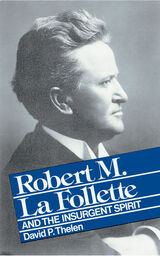
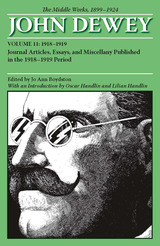
Volume 11 brings together all of Dewey’s writings for 1918 and 1919. A Modern Language Association Committee on Scholarly Editions textual edition.
Dewey’s dominant theme in these pages is war and its aftermath. In the Introduction, Oscar and Lilian Handlin discuss his philosophy within the historical context: “The First World War slowly ground to its costly conclusion; and the immensely more difficult task of making peace got painfully under way. The armistice that some expected would permit a return to normalcy opened instead upon a period of turbulence that agitated further a society already unsettled by preparations for battle and by debilitating conflict overseas.”
After spending the first half of 1918–19 on sabbatical from Columbia at the University of California, Dewey traveled to Japan and China, where he lectured, toured, and assessed in his essays the relationship between the two nations. From Peking he reported the student revolt known as the May Fourth Movement. The forty items in this volume also include an analysis of Thomas Hobbe’s philosophy; an affectionate commemorative tribute to Theodore Roosevelt, “our Teddy”; the syllabus for Dewey’s lectures at the Imperial University in Tokyo, which were later revised and published as Reconstruction in Philosophy; an exchange with former disciple Randolph Bourne about F. Matthias Alexander’s Man’sSupreme Inheritance; and, central to Dewey’s creed, “Philosophy and Democracy.” His involvement in a study of the Polish-American community in Philadelphia—resulting in an article, two memoranda, and a lengthy report—is discussed in detail in the Introduction and in the Note on the “Confidential Report of Conditions among the Poles in the United States.”


Rarely is it possible to hear the voice of the people in a revolution except as it filters through the writings of articulate individuals who may not really be representative. But on several occasions during the effort to draft a constitution for Massachusetts after 1776, the citizens of the Commonwealth were asked to convene in their 300 town meetings to debate and convey to the legislators their political theories, needs, and aspirations. This book presents the transcribed debates and the replies returned to Boston which constitute a unique body of material documenting the political thought of the ordinary citizen.
In an important, extended introduction, the editors, interpreting the American Revolution and its sustaining political framework in light of this material, analyze the forces that were singular and those that were universal in the shaping of American democracy. Comparisons are made with popular uprisings in other parts of the world and at other times, and the whole is integrated into a general discussion of the nature of revolution and its relationship to constitutional authority.

This is a twentieth-century reissue of a distinguished book--a collection of the impressions and experiences of European travelers to America over three centuries, revealing much about the changing viewpoints of Europeans toward the United States.
Oscar Handlin has added a new preface, written from the perspective of 1969. He points out that in 1919 when This Was America was first published, strains among the wartime allies had already appeared, but they had not weakened the memory of joint efforts to defeat Fascism. Anti-Americanism was not yet widespread.
Europeans generally have tended to see in the United States developments which they either disliked intensely or cherished devotedly, and quite naturally their accounts of travels through this country have reflected their feelings. But, however biased, their reports help bring into perspective the troubles of the present as they provide valuable insights into the problems of the past.
The authors of these papers came from many walks of life. They were businessmen, land speculators, merchants, government officials, exiles, artists, students, and priests. What they wrote has a directness of perception and expression that allows both the Old World temper and the New World atmosphere to come vividly alive. Their subjects are as varied as the interests that led them to America.
Here are observations on the country's physical beauty and spaciousness as well as on its social and governmental institutions. More significant, however, are the observations on Americans as individuals, their domestic manners, their ways of life, their adaptations to the new continent and the new society. Oscar Handlin gives us the very cream of their comments, preceded by an introductory paragraph and so organized as to tell an orderly and connected story of American social history. The result is a well founded, entertaining commentary on the United States.
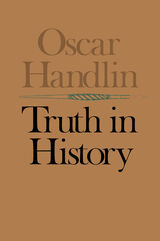
One of the most eminent historians of our time offers here a perceptive guide to the study of history. Truth in History teaches how to read, how to analyze, how to discriminate. It is as helpful to the reader whose history is created daily in the news as it is to the professional historian whose field is in a crisis of disarray.
A Pulitzer Prize winner and mentor for more than a generation of American historians, Oscar Handlin instructs his readers in the fundamentals of his field. He tells us how to deal with evidence, how to discern patterns amid flux, how to situate ourselves in history, and how to recognize where fact shades subtly into opinion. He combines a historian’s knowledge with a historiographer’s breadth and a philosopher’s temperament. He is concerned with a historian’s limitations and with the ways one can operate honestly within those limitations. He brings a full appreciation of the past to his evaluation of what is modern. And while carefully examining recent developments in his discipline, he culls genuine achievements from the trends that confuse originality with true worth.
Handlin everywhere enlivens his discussion with brilliant details. As he pursues broad definitions of history and its uses, he also attends to specific subjects, showing how they bear directly on each other and on his concerns. He deals with Populism, capitalism, laissez-faire, the two-party system, the New History, ethnicity, and roots, treating all with the flair of an accomplished man of letters. Only a scholar of Handlin’s experience and expertise could have brought such a wealth of particular facts to an issue of such general importance: truth in history.
READERS
Browse our collection.
PUBLISHERS
See BiblioVault's publisher services.
STUDENT SERVICES
Files for college accessibility offices.
UChicago Accessibility Resources
home | accessibility | search | about | contact us
BiblioVault ® 2001 - 2024
The University of Chicago Press









